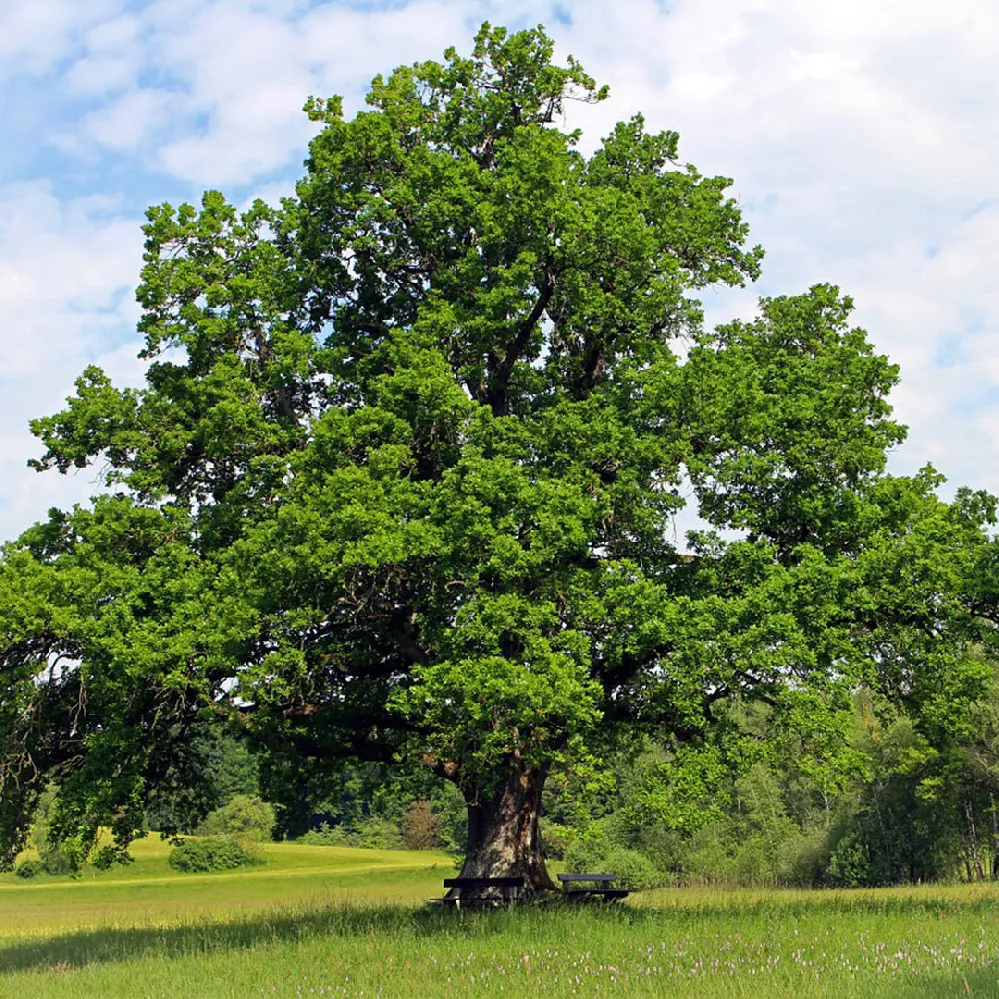- Home >
- Ornamental Trees >
- Sawtooth Oak Tree
Sawtooth Oak Tree for Sale - Buying & Growing Guide
The Sawtooth Oak Tree, or Quercus acutissima, is a fantastic plant option for anyone who wants to add shade to their yard quickly. This species grows fast and reaches more than 40 feet at maturity with a broad spreading canopy. That canopy holds leaves with jagged margins that are the inspiration for this tree's common name, and in spring, the branches also carry a set of gold dangling flower clusters that are showier than those of just about any other oak tree.
- The Sawtooth Oak Tree is an excellent shade tree that grows quickly.
- The flowers of this tree are surprisingly attractive.
- The foliage has a jagged texture.
Enter your zip code to find nearby stores that may carry this plant.
Plant Care
Sunlight

Both full sunlight and partial shade will work for a Sawtooth Oak Tree.
Watering
During droughts and periods of hot weather, water this plant about once per week.
Fertilizing

Feed this tree once per year in early spring with a balanced fertilizer.
Planting and Care
Planting instructions
The Sawtooth Oak Tree shows admirable adaptability to soils overall but prefers to grow in soils that are acidic with great drainage. When planting this tree, begin by digging a hole that is as deep as the root ball is tall and about twice as wide. Loosen the root ball itself to help the roots spread once planted. You should also ensure your Sawtooth Oak Tree has plenty of lateral and overhead space as it will become very tall and wide at maturity.
Watering and nutrients
After planting a Sawtooth Oak Tree, monitor its soil and water often enough to keep the soil consistently moist which could amount to watering daily in some cases. After a Sawtooth Oak Tree has established itself, it can survive on natural rainfall. However, in the case that there has been a lack of rainfall or consistent temperatures in the 90s, you should water this plant about once per week. It’s also best to feed a Sawtooth Oak Tree with a balanced fertilizer once each spring. You may repeat feedings throughout the growing season, but it’s not necessary.
Pollination
The long dangling gold-tinted flowers of a Sawtooth Oak Tree are similar to the flowers of other oaks but often prove to be more ornamentally valuable. Regarding their function, these flowers release pollen into the air where it travels via wind currents. Since the Sawtooth Oak Tree carries both male and female flowers on a single plant, it can conduct self-pollination. When pollination occurs, the Sawtooth Oak Tree will grow large round acorns with frilly caps, which can be quite numerous during some years.
Pruning
You should prune your Sawtooth Oak Tree as needed during the late winter as the tree is exiting dormancy. As is common for most trees, you should remove any branch that is dead or diseased. Without any shaping, a Sawtooth Oak Tree can develop a spreading pyramidal form with branches that emerge somewhat low on the trunk. As such, it’s often best to remove some of the lower limbs of this tree to allow people to walk below the canopy and enjoy the shade there.
Pests, diseases and animals
Overall, the Sawtooth Oak Tree has excellent pest and disease resistance which means keeping this plant healthy should be easy in most cases. With that said, some pest and disease issues are possible. Oak wilt, rot, leaf blisters and powdery mildew can all affect this tree. Sawtooth Oak trees may also experience infestations of oak lace bugs, oak skeletonizers and borers. On the positive side, your Sawtooth Oak Tree will also attract different forms of wildlife as it is a great food source for squirrels, deer and other animals.
Achieving maximum results
If the leaves of your Sawtooth Oak Tree are turning yellow during a time of year when they should be green, then your tree likely has chlorosis. Chlorosis occurs when the soil becomes too alkaline. To resolve this issue, you can amend the soil to make it more acidic or transplant your tree to a different location. Those who grow Sawtooth Oak trees should also know that, during some years, this tree will produce a moderate amount of acorns while in others, it may produce copious amounts—at times enough to coat the ground below the canopy entirely.
FAQs
How fast does the Sawtooth Oak Tree grow?
Part of the reason that the Sawtooth Oak Tree is such a valuable shade tree is that it does not take too long to develop a large canopy. In fact, the Sawtooth Oak Tree typically shows a rapid growth rate of about two feet per year. This rapid growth is a great benefit for those who need shade for their yards—as many other popular shade trees take longer to develop.
Is the Sawtooth Oak Tree cold hardy?
The Sawtooth Oak Tree is adaptable to both warm and relatively cold climates as it is hardy throughout zones 5 through 9. This means that gardeners throughout most of the contiguous United States should have no issue growing a Sawtooth Oak Tree. However, those in the hotter parts of this range may want to grow this species in partial shade rather than full sunlight since too much exposure during hotter temperatures can lead to dieback.
Is the Sawtooth Oak Tree invasive?
The Sawtooth Oak Tree originates in Asia and is a fast-growing species. Those two facts often lead some to assume that this plant is an invasive species. However, most states in the United States do not list the Sawtooth Oak Tree as invasive. Despite that, you should give any Sawtooth Oak Tree plenty of space as it is a large plant that can take up space quickly.
Compare Similar Products
You can't add more Product Name - Product size to the cart.
OK









